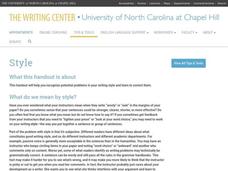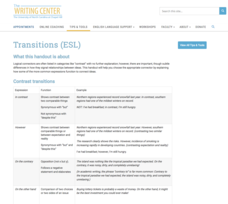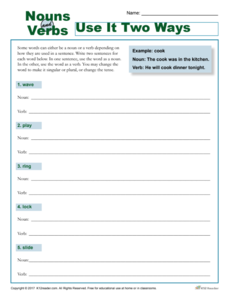Concordia College Archives
Our School Song
Show your school spirit! Class members use instruments or sing along and employ what they have learned in the two previous lessons to perform their school's songs.
University of North Carolina
Style
Just like you choose your clothes to ensure they fit the occasion, you should choose your words deliberately while writing. Style, the main topic of one handout in a series on writing skills, involves choosing words carefully and paying...
University of North Carolina
Transitions (ESL)
When it comes to comparing and contrasting in an essay, looking at a chart and picking a random transition word may not do the trick. As explained in an informational writing handout, the words writers use to move from one idea to...
University of North Carolina
Word Choice
Words matter, particularly in academic writing. Issues such as vague language, wordiness, and cliches make it difficult to get a point across. Part of a larger series to improve writing skills, the handout on word choice shows writers...
University of North Carolina
Grant Proposals (Or Give Me the Money!)
To an outsider, it may seem like college research programs have a lot of money, but there's a lot of work that goes on behind the scenes to secure the funds. A handout on grant proposals, part of a series on specific writing assignments,...
University of North Carolina
Paragraph Development
There's no set length for a good paragraph, but the short block of text should contain key components. A handout on paragraphs, the 12th in a series of 24, outlines a five-step process for paragraph development. Additionally, the handout...
Reed Novel Studies
The Homework Machine: Novel Study
Do opposites really attract? The D Squad in The Homework Machine includes of a quad of opposites. The group, made up of a teacher's pet, a geek, a class clown, and a slacker, make use of a machine to do their homework. In response to the...
Reed Novel Studies
The Invention of Hugo Cabret: Novel Study
If the walls could talk, you might hear Hugo from The Invention of Hugo Cabret. Hugo lives in the walls of a train stations in Paris. Scholars read and complete worksheet activities as they discover Hugo's secrets. They show their...
Feedbooks
Anne of Green Gables
When Anne Shirley shows up in Green Gables, no one knows what to expect. An eBook version of Anne of Green Gables by L.M. Montgomery introduces readers to the spunky girl's journey and the friends she makes along the way. An author...
Reed Novel Studies
The Phantom Tollbooth: Novel Study
Milo, a character in Norton Juster's The Phantom Tollbooth, was bored. When a tollbooth showed up in his room, he went through it simply because he has nothing else to do. Scholars read about his adventures and complete worksheets...
Reed Novel Studies
Summer of the Monkeys: Novel Study
There are more than 260 types of monkeys in the world. With the novel study for Wilson Rawls' Summer of the Monkeys, pupils research interesting facts about the banana-loving primates. They also practice exaggeration, write similes, and...
K12 Reader
Nouns Verbs: Use It Two Ways
Scholars show what they know about nouns and verbs in a worksheet that requires them to read five words then use them in two sentences—as a noun and a verb.
K12 Reader
Change the Verbs to Nouns
Come one, come all to the grammar magic show—where you can transform verbs into nouns! A practice worksheet lists 10 verbs that require suffixes in order to become nouns.
British Council
William Shakespeare
After watching a three-minute video detailing the life of William Shakespeare, scholars take part in several activities designed to show what they know about the famous writer. Learners read a series of eight sentences and put them in...
Literacy Design Collaborative
Macbeth: Influence of Supernatural
Something wickedly wonderful this way comes in a activity that focuses on Macbeth. After a close reading of the play, class members craft a literary analysis essay in which they use evidence from the text to show how Shakespeare uses the...
Literacy Design Collaborative
Exploring Character Development in The Watsons Go to Birmingham - 1963
How did the Civil Rights Movement affect young people in the United States? Scholars read Christopher Paul Curtis' novel, The Watsons go to Birmingham - 1963. Next, they write compare and contrast essays showing how the main characters...
EngageNY
Reading about Freaky Frogs: “The Glass Frog”
Freaky frogs are the focus of a lesson plan designed to boost reading comprehension skills using text features and asking and answering questions. Informational text and a poem supply scholars with animal-related vocabulary and facts. A...
California Education Partners
Telescopes
An assessment challenges scholars to read an informative text then respond with an explanatory essay. The exam begins as participants read a text passage twice then take notes, making sure to jot down key details. Following the...
EngageNY
Performance Task: Readers Theater Performance
It's show time! Scholars finalize their learning by performing their Reader's Theater script of To Kill A Mockingbird. As groups of actors perform, the remaining pupils give feedback using a rubric. After all groups finish, each person...
EngageNY
Scaffolding to Essay: Using Details to Support a Claim
Show me the evidence. Writers analyze the Command of Evidence row of the rubric for A Long Walk to Water essay. Pupils work in pairs to determine how the writer of a model essay meets the demands of the rubric. They then use a Forming...
EngageNY
Analyzing Character: Launching Pygmalion, Part 2
Readers of Pygmalion use Eliza Character Tracker Parts one and two to notice and wonder about character analysis. They read text excerpts and mark details that show how Eliza feels and why she acts in certain ways. To finish, they answer...
EngageNY
Introducing Readers Theater: Pygmalion
It's time to put on a show! Scholars participate in a Pygmalion Readers Theater. They discuss the text-dependent questions from the previous lesson and revisit the Eliza Character Tracker. To end the lesson, individuals reflect on their...
EngageNY
Mid-Unit Assessment: Evidence and Inference in Pygmalion
Scholars complete the Pygmalion mid-unit assessment to show their progress toward the unit's stated goals. The assessment requires learners to read text and successfully answer multiple choice and extended response questions.
EngageNY
Citing Evidence: The Ending of Pygmalion
Show time! After completing questions over Pygmalion section nine, scholars perform a reader's theater activity of pages 87-88. They then revisit their Eliza Character Trackers and add details as needed.






















